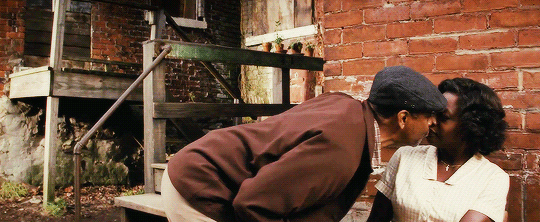 |
| Source |
My biggest gripe with fences is how un-cinematic it feels. The dialogue is fantastic, but there is so much of it coming at your in a steady stream that it began to bog it down. Never has an interval been so necessary. It never feels organic, and despite switching between rooms, the house yard and odd location shot, the 2.5 hours of people standing around talking feels 'stagey' throughout. There are lots of examples of plays being translated successfully from the stage. Dial M For Murder (1954), and 12 Angry Men (1957) are largely in one room the whole time but couldn't be more immersive, and it's impossible to tell A Few Good Men (1992) was based on a play at all. As Fences is so monologue heavy, the lack of breather was really notable. Despite the film often getting stuck on the dialogue, the quality of the text is also it's greatest strength, and acts a platform for those excellent performances.
I also found the ending a tad cheesy and that really jarred. I heard Simon Mayo interview Denzel Washington about Fences and the Troy character. Washington argued with Mayo as to whether Troy was a liar or not, and came across as a man that had spent so long playing this character on stage that he had begun to sympathise with him despite all of his flaws. You could argue that immersing yourself in that character is essential for an actor, but on this occasion I felt it came across in that finale and it all felt a bit heavy handed.
 |
| Source |
Fences was the last of the Oscar nominated films on our list to watch. For me it may be bringing up the rear of that list (along with Lion) but in what's such a strong year that's no bad thing, and I'm glad it's performances received recognition. It's an interesting watch that I would definitely recommend. As much as I loved La La Land (the backlash since it's success has really grated with me, and had it been released a month later I think it would have won), I'm so happy that they eventually found the right envelope and awarded Best Picture to Moonlight. Having now seen it I can understand the late push for Denzel Washington as Best Actor, but Casey Affleck's turn in Manchester By The Sea was one of the best in recent memory in my opinion. We've been really spoilt this January with what has been such a high caliber Oscar season, so I hope that isn't followed by a slump. We have Logan, John Wick 2, and then Patriot's Day and Get Out just round the corner too so there's definitely enough to get me excited still.



Comments
Post a Comment